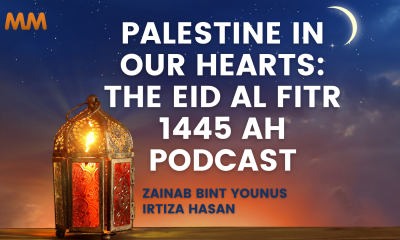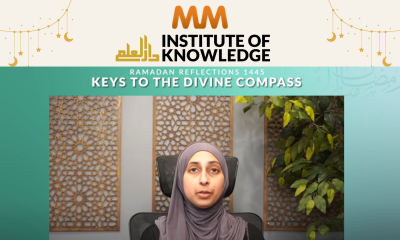#Culture
Ouroboros, Part 13 – Light After Darkness
“My faith in Hassan’s recovery may seem irrational,” Jamilah said. “Like I’m a loser with no life, secluding myself in this clinic, holding on to Hassan out of stubbornness. But that’s not it.”
Published

See the Story Index for a chronological guide to the previous stories.
Keep supporting MuslimMatters for the sake of Allah
Alhamdulillah, we're at over 850 supporters. Help us get to 900 supporters this month. All it takes is a small gift from a reader like you to keep us going, for just $2 / month.
The Prophet (SAW) has taught us the best of deeds are those that done consistently, even if they are small. Click here to support MuslimMatters with a monthly donation of $2 per month. Set it and collect blessings from Allah (swt) for the khayr you're supporting without thinking about it.
Previous chapters of this story: Ouroboros Introduction | Part 1 | Part 2 | Part 3 | Part 4 | Part 5 | Part 6 | Part 7 | Parts 8 and 9 | Part 10 | Part 11 | Part 12
I begin to suspect that my dreams are, in fact, memories. What that says about me – who I am, where I am, and where I’m going – I do not know.
I feel the agony of wounds, burns and cuts all over my body. I lie on my side, unable to stand. The floor moves, rocking from side to side, and a roaring sound fills my ears. Am I on an airplane? A train? I open my eyes and see a young woman in hijab standing over me, her clothing torn and bloodsoaked, her lacerated face a mask of blood and ash. Somehow I know that beneath all of that she is olive skinned, with a sharp nose and brown eyes the color of a desert sandstorm. She is a small woman, but from my vantage she towers over me. Jamilah – the name comes to me like a song on the wind. Her name is Jamilah. She is important to me in some way.
She is looking away, confronting someone I cannot see. I hear the ferocity in her voice as she shouts, “Wallahi, you will not harm this man!” I understand then that she is protecting me, ready to die for me. I feel such gratitude. She is a hero, a warrior queen fee-sabeel-illah. I can feel the icy fingers of death tugging at my insides, trying to draw me down to the cold substratum of the unseen world, but I strike those fingers away. I will not go peacefully into the night – not yet. How can I surrender when Jamilah fights for me with every atom of her being?
The train fades away and there is only grayness, but I do not retreat this time. I stay in this strange half-lit place, sure that I can hear the warrior queen’s voice. She is waiting for me. I just have to find the passage back from my world to hers.
***
Jamilah felt Kadija’s strong arms embracing her. “Hush now,” Kadija said soothingly. “It’s going to be alright.”
But Jamilah could not stop. Her chest shook and the sobs came in gasps, as if she were a drowning person fighting for air. It was as if the little girl, by naming everything Jamilah felt, and pinpointing it so precisely, had opened a channel that allowed those emotions to sluice out like wastewater from a mining operation. She felt ashamed to be breaking down like this in public. She wanted to run to her room and hide, but she was too embarrassed to lift her head.
As Kadija continued to stroke her back and whisper reassuring words, Jamilah slowly calmed herself. The tears stopped flowing and her breath came smoothly but for the occasional hitch in her chest.
She looked up. The steady breeze from the ocean chilled the tears on her face. She tried to smile. “Come on,” she said. “Let’s go visit Hassan.”
“Of course, sweetie,” Kadija said. “I told you they all want to see him. But what about me? Muhammad said that you have reservations about me seeing Hassan. Why is that?”
“Oh!…You know… it seemed like you blamed Hassan for what happened to Layth, and he’s in such a fragile state now. I only want him to be exposed to positive thoughts and words…” She trailed off, embarrassed. Before Kadija had come to visit, it seemed important to protect Hassan from her negativity. But now that Kadija was here and apparently restored to her usual strong and loving self, Jamilah’s fears seemed unjustified.
“I understand.” Kadija took Jamilah’s hand. “I’ll wait outside while the children visit with him.”
Jamilah saw the irony of admitting the children to see Hassan while barring the adoptive mother who loved and cared for them.
“No,” she said, shaking her head at her own ridiculousness. “You come too.”
***
Nurse Dempsey would only allow five people at a time in Hassan’s room. “I don’t care if the Harlem Gospel Choir shows up with Nelson Mandela and the Pope,” she said. “Only five at a time. And only two kids at a time.” Her tone softened, and she flashed a smile. “We won’t count the baby.”
So Jamilah, Alice, Kadija and Layth Jr. remained in the room as the children filed in two at a time. Kadija introduced each pair of children to Hassan, then gave the kids five minutes to chatter away in English or Indonesian.
Jamilah was sweating beneath her hijab and long-sleeved shirt. She knew intellectually that the room temperature was fine – in fact, with the window partially open, the breeze kept the air fresh and cool. Still, the room felt confining and hot. Ever since her experience two years ago she became agitated when people infringed upon her personal space. Someone standing too close to her in line at the grocery store, a friend looking over her shoulder while she read, people standing in a knot around her, not giving her a clear avenue of escape – these things made her feel like lashing out. Right now she wanted to back into a corner or get out of the room. But she’d already made enough of a fool of herself with the crying jag, so she tried to relax.
The first two children to meet Hassan were the eldest, Starlight Sky, and the youngest (aside from Layth Junior). Starlight Sky was fifteen and looked European, with fair skin and tawny-brown hair. Yet she spoke to Hassan in Indonesian. Jamilah of course did not understand what she said, but her ancient-seeming green eyes spoke for her, hinting at a life of suffering best forgotten.
The boy was Maung Tin, the skinny one Jamilah had noticed with the dark skin and white hair. He was seven years of age – older than Jamilah had thought. Now that she saw him up close, she could tell that his hair was naturally white all the way down to the roots.
Maung Tin reached out and stroked Hassan’s beard, and touched his shoulder-length hair. He did not speak a word.
Jamilah later learned that Maung Tin was, in fact, a Rohingya. He’d grown up in a camp for displaced people near Myanmar’s eastern border. He was kidnapped at the age of four and held hostage on a ship with dozens of other Rohingya kids. He remained on that ship for three months, where he was frequently beaten, until he was ransomed back to his parents for two hundred dollars. A year later his parents were killed in a massacre carried out by Buddhist monks. Maung Tin survived by hiding in a chicken coop for two days. The boy’s hair turned white after that day, and he stopped speaking altogether.
Maung Tin’s uncle paid a human trafficker to bring them both to Indonesia. Shortly after their arrival, the uncle appeared at Bait As-Salam with the boy in tow, related his story, and disappeared – no one knew to where.
The next two were a pair of identical twin girls. They were broad-shouldered, with strong, wiry muscles. These were the two Jamilah had seen doing gymnastics outside.
“Their names are Naeema and Naeema,” Kadija explained. “That’s right. Same face, same name. Lord help us. We call them Cutie and Wootie.”
Last came Munirah and a rangy boy named Saleem who seemed constantly about to burst with pent-up energy. The boy stood at Hassan’s bedside and spoke to him in excellent English, shifting from foot to foot as he did so, flexing his knees, almost hopping in place. He talked about the airplane ride from Indonesia, and how, when he’d looked out the window, he wanted to jump out and bounce on the clouds like trampolines.
“Go,” Kadija said after a few minutes. “Skedaddle outside and play.” The boy dashed out of the room, along the way crashing into the cabinet against the wall and knocking over a glass pitcher of water, which rolled to the edge of the countertop – pouring out water the whole time – then fell, cracking but not shattering. Jamilah let out a strangled scream and practically leaped out of her chair, her heart running like a spooked horse. Layth Jr. began to cry, but Munirah picked him up and he quieted immediately.
“Sorry,” Kadija said as she grabbed a towel from the bathroom and mopped up. “You know the parable about the unstoppable spear meeting the unbreakable shield? Leave that child alone with them and he’ll break them both toot sweet.”
Jamilah needed to get out. There were too many people in the room. She was about to get up and make her way outside, when Chef Samuel appeared in the doorway.
“Buenas tardes señoras y niños,” he said. “Lunch is served. Señora Kadija, I hear that you come from Indonesia, so I make something special for you. Grilled seabass, rice with coconut milk, gado-gado salad, and for dessert is not so Indonesian, we have ice cream sundaes with dark chocolate sauce.”
“Bless your heart!” said Kadija. “What a sweetheart. Did you hear that kids? Ice cream.”
The kids let out a cheer, except for Maung Tin who only smiled.
Kadija winked. “They eat Indonesian food every day. It’s the ice cream that they’ll love you for.”
After lunch they prayed dhuhr in the chapel just off the main hall. Jamilah finished her dhikhr and glanced up at the clock. It was 1:05 pm.
“I’m late for a meeting,” she said to Kadija. “I know you and Munirah didn’t get your time with Hassan. You can visit him without me.”
Kadija smiled. “I appreciate that, but the kids are tired. I’m going to take them back to the hotel for a nap. We’ll come return five, how’s that?”
Jamilah nodded. That was perfect.
***
Shamsi and Mo were waiting in the sunny conference room. Mo sat at one side of the table, while Shamsi claimed the head, perhaps asserting her position of authority. She had before her a pad of paper and one of the expensive pens that she was fond of. She tapped the pen impatiently on the table.
Jamilah took a seat opposite Mo. Shamsi reached out to pat her hand, but Jamilah pulled her hand back.
“Alright,” Shamsiyyah said, sitting up straighter in her chair and adjusting her glasses. “We’re here to discuss whether patient Hassan Mirza – “
“Bismillah,” Jamilah said. “His name is Hassan Amir. “If we’re going to talk about killing him,” she added coolly, “let’s call him by his real name.”
“Well…” Shamsiyyah frowned, flustered. “I thought we agreed that in the interests of protecting his identity – “
“There’s no one else in this room. And this meeting is pointless. You don’t have the authority to turn off Hassan’s respirator, and I will never agree to it.”
“I may not have the authority, but Muhammad and I together do. I have a responsibility to the patient – “
“What do you say, Mo?” Jamilah demanded. “What’s your vote?”
Mo rubbed his forehead lightly with a fingertip. “What I say,” he replied slowly, “is that I want to hear what Dr. Al-Husayni has to say.”
“Fine.” Jamilah sat back and crossed her arms.
Shamsi rolled her pen back and forth between her fingers. “The situation we have here is difficult. The patient has no living will, and no legal family to act on his behalf. Yes, the three of us made an agreement to jointly make crucial decisions regarding Hassan’s care. But I wonder if that agreement is not harming the interests of the patient by deadlocking us on vital issues.
“The patient has no quality of life, no signs of recovery, and continues to deteriorate. He’s been on mechanical ventilation for three months. I don’t know if you realize that the longer he’s on a ventilator, the greater the chances of ventilator-assisted pneumonia and trauma to the airway. We’re constantly battling the ulcers that form on the inside of his mouth and lips, and possibly on the pharynx as well. The threat of MRSA or some other resistant infection is ever present. It is not feasible to keep him intubated over the long term. We’ve been following standard protocol to wean him off ventilation by gradually reducing supplemental oxygen. It’s my feeling that it’s time to extubate. Remove the ventilation tube, in other words.”
“What will happen,” Jamilah said, “when we do that?”
“There’s no way to know. He might be able to breathe on his own. I believe, however, that he will most likely die, and that we should allow that to happen.”
Jamilah stared. How could Shamsi say that so casually, as if she were talking about an earthworm dying on the sidewalk.
Shamsi held up a hand and continued. “Jamilah, I know you care deeply for Hassan, and I admire that. But are we keeping him alive for his sake, or yours? If it’s for your sake then that’s selfish. It’s unethical, and undignified for the patient. You need to think about the fact that he’s losing muscle and bone mass steadily, being rolled one way and the other like a log, being bathed, urinating into a tube… Is that how Hassan would want to spend his life? Would you?”
Jamilah felt a surge of anger. More than that, she felt wounded. Shamsi almost seemed to be accusing her of abusing Hassan in some way. Calling her selfish… that hurt. She tamped her anger down, knowing that losing her cool would not help. It would only make her look out of control and juvenile. Maybe that was what Shamsi wanted.
How had her relationship with Shamsi deteriorated so badly, to the point where Jamilah did not trust her cousin at all?
She ignored Shamsi and spoke to Mo. “My faith in Hassan’s recovery may seem irrational. Like I’m a loser with no life, secluding myself in this clinic, holding on to Hassan out of stubbornness. But that’s not it. I can’t explain it to you, Mo, except to say that I feel his presence. Wallahi, if I thought Hassan was truly gone, I’d pull the plug myself. I would never want him to suffer needlessly. But he is not finished in this life. Think about how much he’s survived. He died and came back three times! Hassan doesn’t give up.”
“Then why is he not recovering?” said Shamsi.
“He’s not ready. He’s afraid. He has lost so much. He’s waiting for something. There’s something he needs to hear, or believe. Miracles don’t happen on cue.”
Shamsi began to say something, but Jamilah held up her hand for silence. She closed her eyes, took a deep breath, and continued. “I sit out there on the headland, watching the waves. The sea can be gray as slate, then a tremendous wave rises up, and it’s green in the middle, and white on top. When the sun is setting it catches the top of the wave and the foam glows orange. The big ones, they sound like a high wind. Before they break they actually curl in on themselves, and for an instant each wave is a perfect work of art. Every wave is a miracle for one split second.
“If I’m up there, and I’m watching, then it’s as if Allah is creating these magnificent art works, these ephemeral miracles, over and over, just for me. It’s humbling.
“But sometimes I think, what happens when I’m not there? What if there are no beachcombers, no surfers, no sailors, no one to see? Is each wave still a miracle? And if it is, and no one sees it, is the miracle wasted? That wave is gone. The next will be different. It’ll be someone else’s miracle, because no one was watching. No one cared.”
Shamsi dropped her pen on the wooden tabletop and threw up her hands. “I… you talk to her, Muhammad.”
Mo nodded his head slowly. “We’re watching, Jamilah. We’ll see the miracle when it comes.”
Jamilah had an idea. It came to her as if carried on a ray of sunlight, and made her eyes widen. “We need to get Munirah Azeez to examine him.”
Shamsi frowned. “Who is that?”
“She’s…” Jamilah realized how ridiculous this would sound. She took a deep breath. “She’s one of Kadija’s adopted daughters. She seems to have the ability to perceive whatever is troubling a person. I think we should have her examine Hassan.”
Shamsi stared incredulously. “You don’t trust my professional opinion,” she said slowly, as if speaking to a small child, “but you want some kid to examine him?”
“It sounds strange to me too,” Mo said. “But let’s give it a chance.”
Shamsi snatched up her pen and stood. “We’ll continue this another time,” she snapped. “I have a duty to the patient that goes beyond people’s fantasies. The current situation is untenable.” She stalked out of the conference room.
When she was gone, Jamilah said, “We need to replace her, Mo.”
“What? Why?”
“I don’t trust her. She doesn’t belong here. Can’t you tell she’s chafing? She was a trauma surgeon at a busy hospital. That’s exciting. This -” Jamilah waved her hand to include the entire clinic – “is routine. And she and I rub each other the wrong way. Ever since I started praying and wearing hijab, there’s been a chasm between us. We seem to automatically take opposing positions and entrench ourselves. I don’t believe she can be objective.”
“Jams!” Mo held out his palms in a placating gesture, then dropped them and shook his head, as if acknowledging defeat before even making a counter argument. “I’ll think about it.”
“Thank you, Mo. I’m…” She lowered her voice in embarrassment. “I’m grateful to you for everything. And I’m grateful that you voted my way.”
Mo looked up, clearly peeved. “I didn’t do it for you, Jams. I did it because I believe in Hassan and I love him. But sister, if I come to believe that Hassan is truly gone, and that we’re caring for nothing more than a wasting body, you’d better believe we’re shutting it down. He deserves better than that.” He stood and walked out with a muttered, “As-salamu alaykum.”
“Wa alaykum as-salam,” Jamilah said quietly, even though Mo was already gone. He seemed to be walking away from her a lot lately. That scared her. She had no one left but him and Alice. No one who understood what she’d been through.
Ya Allah, she thought, Give these people a sign, and make it soon.
***
Later that afternoon, when Kadija returned with the kids, Jamilah asked Munirah Azeez if she would be willing to use her special gift to examine Hassan. The girl agreed, and Kadija gave her approval.
Jamilah held little Layth as Kadija and Munirah approached Hassan’s bedside. The other kids were outside playing. Layth immediately latched onto Jamilah’s nose with his cute – but surprisingly strong – little hand. What was it with this kid and her nose?
Mo entered the room, said a quiet salam and sat down beside her.
“As-salamu alaykum brother Hassan,” Kadija said. “It’s been a month of Sundays. Look at you, spread thin like cold supper. I’m sorry I’ve been away. For a while, I felt like I’d been chewed up and spit out. And I’ll be honest. I blamed you for Louis’ death.”
Jamilah stiffened, about to stand and drag Kadija out of the room if necessary, but Mo waved her down. “Give her a chance,” he whispered.

“I’ve taken so much comfort from those ayahs. Louis died protecting me and Jamilah. He was a shaheed. That means he’s not dead! He is alive right now, rejoicing. He’s happy! And I know that he…” Her voice became choked, and she paused, composing herself. “I know that he loves you.
“Louis repeated to me something you said that helped him. You said that Allah is Merciful beyond all bounds. He forgives and He guides whoever He wills. You’re not the first or the last to make terrible mistakes. There were companions of the Prophet who fought against the Muslims before embracing Islam. Forgiveness is there for all of Bani Adam if they ask.
“There’s something else you told him. You said he should think of the people he’d helped. I say the same to you, Hassan. How many people did you save in Tel-Az-Zaytoon? That was just one day. Your martial arts class for the sisters, your kindness to your friends, and Bait As-Salam. I’m a witness to how many lives you’ve saved. These children who just visited, some might not be alive if not for you.
“Speaking of which, there’s one more child with something to say.”
Kadija stroked Munirah’s shoulders and nodded.
Jamilah didn’t know what Munirah Azeez could do for Hassan. He was, after all, in a coma. And it was entirely possible that the child had no special ability at all. She might simply be extraordinarily empathic, or maybe even just a good observer. Nevertheless, she watched with bated breath.
“As-salamu alaykum Hassan?” the child said in her small, oddly interrogative voice. “I am Munirah, the girl you used to write to at Bait As-Salam. I miss your letters. We all do.”
She reached out and laid a hand lightly on Hassan’s chest, exactly where he’d been shot so many years ago in Syria. Jamilah watched intently. After a moment the child’s breathing slowed, as if she were entering a trance. A full minute passed.
“Wan play,” Layth Jr. said, tugging on Jamilah’s hijab. He squirmed, trying to climb down from her lap. She tried to hold on to him; it was like wrestling a baby alligator. “Wan play out-tide,” he insisted.
“Shhhh,” Jamilah said. “Just wait a minute, okay?”
Suddenly Munirah’s muscles tensed. Jamilah saw the rigidity in her back, and the way her forearm muscles stood out.
Kadija noticed it too. “Munirah?”
The girl did not respond.
Shamsiyyah suddenly stepped forward from the doorway – Jamilah had not even known she was there – and took a hold of Munirah’s chin. With her other hand she drew a small flashlight from her coat pocket and shined it into Munirah’s eyes. “Her pupils are dilated and non-responsive,” she said in a clipped tone. “Has she ingested anything strange? Is she taking any drugs?”
Kadija looked frightened. “Heavens, no. This hasn’t happened before.”
Munirah let out a long breath, and the tension drained out of her muscles. She looked up at her mother, then pointed to the breathing tube that forced air into Hassan’s lungs, keeping his chest rising and falling, keeping him alive. “He doesn’t want this,” she said flatly, with no trace of doubt in her voice. “You can take it out.”
Shamsiyyah used a stethoscope to listen to Munirah’s heart and lungs. “I want to do a full medical checkup on her if you don’t mind.”
Kadija nodded. “That’s fine. When do you want to do that?”
“Now.”
“Hold on,” Jamilah protested. “What about what she said? Munirah, dear. What do you mean that he doesn’t want it? Surely you don’t mean that he wants to die?”
The girl shook her head. “No, mum? He doesn’t need it? He can breathe without it.”
“Kadija.” Shamsi’s tone was grim. “Would you take Munirah to my office and wait there?”
“Sure,” Kadija said. “But you’d do well to listen to her. She has a gift, and she’s never been wrong.”
When they were gone, Shamsi rounded on Jamilah, her eyes flashing. “Are you out of your mind? This child is being exploited. Did her mother charge you anything for this hocus pocus?”
Jamilah’s face flushed with anger and she stood, her hands clenched.
Mo put his hands out in a calming gesture. “You’re out of line, doctor.”
“This is outrageous!” Shamsi continued. “You rejected my professional medical advice, but now because a child says so, you want to shut off the ventilator? Am I the only sane person here? Is this a medical clinic or a mental hospital? What am I even doing here if this is how you want to run things?”
“But Dr. Al-Husayni,” Mo said, his tone gentle. “Didn’t you want to turn off the ventiliator?”
“Will you take responsibility for the consequences, Jamilah? Do you understand that if we shut it off, there’s no going back? We will not reintubate. If he can’t breathe on his own, we will let him die with dignity. Is that clear?”
“I understand,” Jamilah said, stifling her desire to say more.
“Very well,” Shamsi said. “Tomorrow morning. 9 am. If you are still willing, we will shut it off then.”
***
I’m drifting on a black ink ocean, floating like a man who has been shipwrecked, unable to see any part of my own body and not caring. A man can get used to anything, even loneliness and unremitting darkness. Or perhaps a man in such a place goes insane, so that he lives in a perpetual dream inside his own head, and the physical world no longer registers or matters. Maybe that’s where and what I am now.
Someone touches me. I feel the shocking heat of a palm on my chest, and it’s more corporeal than my own heartbeat. I can’t remember the last time I felt another person’s touch. Unlike this purgatory in which nothing ultimately matters, the hand seems to come from a dimension where objects have true solidity and warmth. I don’t know whose hand it is, or how this is possible in this unbroken nothingness, but I am certain that I know this person, and that it is someone I care for.
I spin around, arms reaching, not drifting anymore but standing on my feet. Where before there was only darkness, a point of light appears at a distance, as if from a single, twinkling star. It is enough to orient myself so that I know up from down.
A rocky path appears. This is a new thing, and I observe it for a long time, feeling excited but wary. The stones glow faintly, like the bioluminescence of a deep sea creature. Finally I take a step. When I look back, I see nothing but darkness. I can travel ahead, down the beckoning path, or wander back into the blackness.
It is not an easy choice to make. I know what lies behind: oblivion. That Cimmerian ocean – like the deep hole – was not a happy place, but it was a place I understood. I could live there or die there, and both prospects bore consideration.
On the other hand, the destination ahead – if there is one, and this is not another dream – is a mystery, fraught with frightening secrets. Knowing that they are secrets I have kept from myself does not make them easier to bear.
I remember the warrior queen standing over me, covered in blood, fighting for my life. She was ready to sacrifice her life to protect me, and I suspect that others made sacrifices as well. If I were to cower now, I would invalidate their heroism.
I begin to remember something else as well. Thoughts come that I have not had in an age, maybe a millennium. I remember that I was once more than I am. I recall little of the details of my life, but I remember that I once trusted Allah more than I feared any secret or any nightmare. I remember that La ilaha il-Allah was my shield, my sword, my hearth fire and my home, and I needed nothing else to survive. I remember that my heart was once a barren field, until the rain of faith made it bloom like flowers in the desert. I wasn’t afraid of the truth: I embraced it. This hiding in the darkness, this isn’t me. Somehow I forgot that. I forgot who I am, but it’s coming back now and I’m ready to stand beneath the sun again.
I remember too that I made a long journey once, seeking a better life. I can do it again. This is all I know about myself now, in this moment: My name is Hassan and I am not afraid.
I set my feet on the glowing path and begin to walk.
It’s not easy. The path rises and falls steeply, but mostly seems to climb. I clamber up steep slopes, hop from stone to stone, travel around boulders and bear-crawl carefully over old avalanches of gravel and scree. My legs grow tired. The gravel slips, so that I fall, cutting and bruising myself. Worst of all, I can’t speak. I’ve never been able to speak in this cursed place, except in my dreams. There’s a cobra lodged in my throat, choking me. I try to cough it out but I can’t. I want to scream or to tear my own throat open. But I’ve learned that nothing I do makes a difference, so I endure it and continue climbing.
***
It was early and the clinic was mostly quiet. Jamilah opened her copy of the Quran and began to recite to Hassan from Surat Yasin. Time passed, and when she next looked up it was 8:30 am. Shamsi arrived with Nurse Dempsey and Dr. Jyoti, one of the other two staff physicians. Sandra and Jyoti greeted Jamilah, but Shamsi went directly to Hassan and spent a few minutes checking on him. She made a comment to Nurse Dempsey to keep an eye on Hassan’s right shoulder blade, as it looked like an a skin ulcer might be forming.
Mo walked in, looking haggard – a difficult night with Alice and her 3 am sardine sandwiches?
Shamsi acknowledged Jamilah for the first time. “Do you still wish to proceed with extubation?”
Jamilah nodded silently. She felt calm. She could almost feel the life energy radiating from Hassan. She couldn’t explain it, but she was not afraid. Seeing that Shamsi was waiting for a verbal response, she said, “Yes. I’m ready.”
“Very well. I’m going to ask you to sit in the waiting room while we extubate.”
Jamilah began to protest, but Shamsi cut her off. “It’s non-negotiable. And that includes you, Muhammad. We need room to work, and we can’t have distractions.”
“This situation is serious,” Shamsi continued. “Ideally when extubating, the patient should be alert and cooperating. Extubating a comatose patient is extremely problematic because the cough reflex may be nonfunctioning, which presents a risk of damage to the vocal chords when we remove the tube. Other risks include hypoxemia and pulmonary edema. However, all the other positive criteria, such as stable arterial blood gas levels, are present. We also stopped feeding last night to minimize the chances of aspiration of the stomach contents.
“All of this is assuming that he breathes on his own. You need to prepare yourself for the likelihood that he will not breathe on his own, and will not survive. If that is the case, I will call you in to say your goodbyes. Or if you prefer, you can say your final words now.”
“No,” Jamilah said. “No goodbyes.”
In the waiting room, Jamilah utilized a calming technique that Hassan had taught her over two years ago, the day her bicycle was stolen. She closed her eyes and focused on the inhalations and exhalations of her breath as it passed through her nostrils. Then she gave her mind permission to go back in time to any place in which she felt happy and safe.
She found herself sitting on the grass at Jackson Park, after salat-adh-dhuhr. It was a few months after she and Hassan had initiated this outdoor prayer tradition. The group had grown, so that on some days there were a dozen people attending prayer. Jamilah sat in jalsah, the final position in salat, flanked by two sisters on either side. The Imam – a Sudanese cab driver – said salam, and she followed.
It had become a tradition for someone to share a story, thought or even a song after prayer. On this occasion, after a few minutes during which people said their istighfar and dhikr, it was Hassan who raised his voice and began to sing. Jamilah had never heard him sing before, and for some reason she was surprised to find that he had a deep and resonant singing voice.
Jamilah did not know the song, but a few brothers joined in:
Going to meet Allah,
lay our burdens down before Him,
Going to meet Allah,
Master of the sky and stream.
Going to meet Allah,
have no fear He’ll treat you kindly
on the other side of this dream.
Though the lyrics were uplifting, there was something plaintive in Hassan’s tone. Jamilah could imagine that when he sang, “Master of the sky and stream,” he wished he were in some far-off field right now, alone with the river and the blue sky.
The song went on:
Fear is a hurricane,
Imaan is a summer rain.
Hatred is a gnawing cancer,
Mercy is the only answer.
Peace to me and peace to you,
trust Allah and we’ll get through.
Love Allah with all your power,
get ready for the final Hour.
Jamilah continued her meditation, remembering the details of that day: the fog that swept in just as Hassan and the others finished their song, dropping the temperature and enveloping the world in gray; the long-limbed Arab sister with perhaps too-heavy makeup sitting beside her, fingering the beads of her sandalwood sabha; the radio of a bike messenger, crackling with dispatch orders; the sound of the water splashing in the nearby fountain, and the honking calls of a flock of geese as they passed overhead, invisible in the fog…
***
Walking the steep, stony path, I chant Allahu Akbar in my mind as I climb uphill, and SubhanAllah downhill. Whenever I stumble, I send blessings on the Prophet, sal-allahu alayhi wa sallam. When doubts rise in my mind, I seek refuge from Shaytan.
In this way I continue upward. When I feel so weary that I cannot continue, something remarkable happens. The snare that has been caught in my throat for so long, the one that prevents me from speaking, that chafes and beats like a thunderous clock in my ears, trying to force me into robotic patterns of movement and thought – it vanishes in a rapid slithering motion, as if it has come to life and decided it has better things to do than occupy my body.
I double over and cough violently, saliva and bile coming from my mouth. I drop to my hands and knees, breathing hard – breathing! My breath is my own. The metronome, the mechanical tide, the beating of the terrible clock – they’re gone. I wipe my mouth and stand, testing my voice. It comes out in a whisper: La ilaha il-Allah. That whisper is like a shout in my mind, so long has it been since I have spoken.
The path glows even more brightly, and the sky is lighter ahead, as if dawn has arrived. Energized and filled with hope, I stride, and climb, and move forward.
***
Jamilah came out of her meditation to the sound of Shamsi clearing her throat.
“The extubation is complete,” Shamsi said. “We used the nebulizer to deliver medication to reduce inflammation and edema. The next several hours will be crucial. We’ll be monitoring him constantly.”
“What are you saying, doctor?” Muhammad asked. “Is he okay?”
“He’s still comatose, of course,” Shamsi said. “But he is breathing on his own. I’m quite surprised… I mean… This is obviously a desirable result… But there’s a strong chance of relapse… I don’t know what else to say.”
Jamilah closed her eyes and let out a long, deep breath of relief. “Alhamdulillah,” she whispered. “Subhanaka ya Allah.”
***
The world slowly brightens. The light is painful, making me squint, but after a while I grow used to it. Peering ahead, it’s as if I’m looking through a sheet of gauze, but I can make out a woman sitting in what looks like a spacious hospital room. She wears a long brown skirt, a blue blouse with a floral pattern around the collar, and a white hijab. A round pin on the front of her blouse reads, “FREE PALESTINE”.
I know this woman. It’s the warrior queen of my dreams. It’s Jamilah.
I smile, because the Jamilah in this dream looks so unlike my last memory of her, when she stood above me, covered in blood and ash. Now she looks beautiful and elegant. She’s reading, and when she shifts position the afternoon sunlight streaming in through the window illuminates the cover of the book. It is a law book, something to do with copyrights.

She closes her book and stands as if to leave. Even though this is only a dream, I don’t want her to leave. I have this idea that if she would just turn and look, she’d see me. She has her back to me, and I’m hit by a terrible fear that if she doesn’t see me – if she walks away – I will slip back into darkness, back into that terrible, lightless ocean, or the hole deep in the ground, and I will not return. I will fall forever, alone, haunted by nightmares. I feel terror, and let out a choking sob.
Desperately, I try to speak. “Jamilah,” I try to say. “Don’t go. I’m here!” But my voice does not work, and nothing comes out.
Another woman walks into the room – a nurse, short and dark-skinned, with alert, intelligent eyes. She hands Jamilah a cup. She is almost facing my direction and I send my thoughts to her, willing her to look at me, notice me, and not to let Jamilah leave.
***
The day after Hassan’s extubation his blood oxygen levels dropped alarmingly and he was fitted temporarily with a breathing mask. The next day, Dr. Jyoti had to suction saliva and mucus from his throat so that he did not suffocate. Jamilah hardly slept or left Hassan’s room during that time.
After that, however, his condition seemed to stabilize. On this particular Friday, five days after the extubation, Jamilah was studying copyright law. Kadija and the kids had departed that very morning for San Francisco, where Kadija planned to list the house in Bernal Heights for sale then return to Indonesia. Jamilah had fallen behind in her studies, so she’d spent the morning poring through her books and making notes. Copyright law was tedious, and after hours of study she decided to head out to the headland for a bit of ocean-watching.
As she was about to leave Hassan’s room, Nurse Sandra appeared with a cup of coffee.
“You’ve been cracking those books with a whip, girl,” the nurse said. “I thought you could use this.”
Jamilah took the coffee gratefully. “Sandra, they broke the mold when they made you, I’m telling -” She broke off when she saw the look on Sandra’s face. The diminutive but beautiful nurse stood frozen in place, staring at Hassan with a looked of stunned amazement. Jamilah spun, fearing that Hassan was experiencing another medical crisis.
Instead, she found herself looking into Hassan’s open eyes.
Jamilah stared into Hassan’s open eyes, not blinking, afraid that if she looked away for even a second this would turn out to be an illusion. Alhamdulillah, she thought. SubhanAllah She could formulate no other thought.
Hassan’s eyes remained fixed on her, even when Sandra moved toward his bed to press the call button.
“No,” Jamilah said, stepping toward Sandra and gripping her arm to stop her. Hassan’s eyes followed her when she moved. “Only you, me, Mo and Shamsi can know about this. Go notify Shamsi in person. Tell no one else!”
Jamilah had considered this moment, and how it should be handled. This was the kind of story that the media loved. Man wakes up after two years in a coma. All it would take was a bit of gossip among the staff, and one call to the local newspaper, and the story would go viral. She couldn’t allow that. Hassan’s room was at the very end of the south wing specifically to isolate him from the other patients and staff. No one came to his room or even passed by his door except his assigned doctors and nurses. There was no reason for anyone else to know about this.
Sandra nodded and practically ran out of the room.
Jamilah turned her full attention to Hassan. After thinking about this moment for two years, and rehearsing speeches in her head, she found herself tongue tied.
“Hassan,” she said finally. “Are you… do you know who I am?”
He nodded slowly but did not speak.
“Can you speak? Can you… what do you remember?”
She saw his throat and mouth move as he strained to speak, but no sound emerged. She felt a surge of fear. Was he brain damaged, as Shamsi had warned?
As if summoned by this thought, Shamsi hurried into the room, out of breath. “Leave this to the doctor, please,” she said.
Shamsi took Hassan’s right hand in hers. “Squeeze my hand.” Jamilah saw Hassan’s fingers contract. Shamsi repeated this with his left hand. Then she held up her expensive pen, and moved it left and right. “Follow this with your eyes.” Hassan’s eyes tracked the pen. “Lift your right hand. Good, now your left.” Hassan did so. “Can you tell me your name?”
Hassan’s voice came in a barely audible whisper, too faint to understand.
“Stick out your tongue,” Shamsi said. When Hassan did so, she pressed on his tongue with a wooden tongue depressor. “Do you feel that?” Hassad nodded.
“Okay, that’s good,” Shamsi said. “No trauma to the hypoglossal nerve. You’ve been intubated for a long time, and it’s normal to have a sore throat and hoarseness. That will clear up in a few days. You also have some ulceration of the mouth and lips. It’s possible that’s affecting your ability to speak. A worse case scenario is that you suffered laryngeal or vocal cord damage during the intubation or extubation, which can cause vocal cord paralysis. But let’s not jump to conclusions.”
All this time Hassan had mostly not taken his eyes from Jamilah. Shamsi seemed to notice this. “Do you know her?” Hassan nodded his head.
“What about me?” Shamsi said. “Do you recognize me?” Hassan regarded her for a moment and shook his head.
Mo came running into the room. He saw Hassan and exclaimed, “Oh my God!” He rushed to the bedside opposite Shamsi and embraced Hassan, kissing him on the forehead and the cheek. When he finally pulled back there were tears streaming down his face.
“Do you know him?” asked Shamsi.
Hassan studied Mo for a long moment, then made a writing motion with his hand. Shamsi took out a small writing tablet and handed it to him along with her precious pen. With a shaky hand, he wrote, “Sit.”
“You want to sit up?”
Hassan nodded, and Shamsi adjusted the bed so that Hassan sat almost upright. He was so thin. Jamilah still could not believe that this moment had arrived. She’d always known that he would wake up one day, but still, there was an element of the miraculous to it, as if she were getting a glimpse of the final resurrection, when they would all rise from their earthy beds and stand once again.
“You didn’t answer my question,” Shamsi said. “Do you know this man?”
Again Hassan regarded Mo, then slowly wrote, “Not sure.”
Jamilah exchanged a frightened glance with Mo. It could be expected that Hassan might not recognize Shamsi. He’d met her only a few times, over two years ago. But how could he not know Mo? What did it mean?
Hassan wrote something else. It took a long time, as his arm began to tremble badly. Finally he turned the notebook around. In large, jittery script, he had written, “Where is my wife? Where is Lena?”
Keep supporting MuslimMatters for the sake of Allah
Alhamdulillah, we're at over 850 supporters. Help us get to 900 supporters this month. All it takes is a small gift from a reader like you to keep us going, for just $2 / month.
The Prophet (SAW) has taught us the best of deeds are those that done consistently, even if they are small. Click here to support MuslimMatters with a monthly donation of $2 per month. Set it and collect blessings from Allah (swt) for the khayr you're supporting without thinking about it.
Wael Abdelgawad's novels can be purchased at his author page at Amazon.com: Wael is an Egyptian-American living in California. He is the founder of several Islamic websites, including, Zawaj.com, IslamicAnswers.com and IslamicSunrays.com. He teaches martial arts, and loves Islamic books, science fiction, and ice cream. Learn more about him at WaelAbdelgawad.com. For a guide to all of Wael's online stories in chronological order, check out this handy Story Index.


[Podcast] Palestine in Our Hearts: Eid al-Fitr 1445 AH

Foreign Affairs Official Resigns Over Gaza Genocide

A Ramadan Quran Journal: A MuslimMatters Series – [Juz 30] Solace For The Sincere And Vulnerable

IOK Ramadan: The Importance of Spiritual Purification | Keys To The Divine Compass [Ep30]

IOK Ramadan: The Power of Prayer | Keys To The Divine Compass [Ep29]

IOK Ramadan: 7 Qualities of Highly Effective Believers | Keys To The Divine Compass [Ep18]

IOK Ramadan: Choose Wisely | Keys To The Divine Compass [Ep15]

IOK Ramadan: Shake the Trunk of the Tree | Keys To The Divine Compass [Ep16]

IOK Ramadan: They Were Not Created Without Purpose | Keys To The Divine Compass [Ep23]

IOK Ramadan: Appreciating the Prophet ﷺ | Keys To The Divine Compass [Ep22]

IOK Ramadan: The Importance of Spiritual Purification | Keys To The Divine Compass [Ep30]

IOK Ramadan: The Power of Prayer | Keys To The Divine Compass [Ep29]

IOK Ramadan: The Weight of the Qur’an | Keys To The Divine Compass [Ep28]

IOK Ramadan: Families of Faith | Keys To The Divine Compass [Ep27]

IOK Ramadan: Humility in Front of the Messenger | Keys To The Divine Compass [Ep26]
Trending
-
#Islam2 weeks ago
IOK Ramadan: 7 Qualities of Highly Effective Believers | Keys To The Divine Compass [Ep18]
-
#Islam2 weeks ago
IOK Ramadan: Choose Wisely | Keys To The Divine Compass [Ep15]
-
#Islam2 weeks ago
IOK Ramadan: Shake the Trunk of the Tree | Keys To The Divine Compass [Ep16]
-
#Islam2 weeks ago
IOK Ramadan: They Were Not Created Without Purpose | Keys To The Divine Compass [Ep23]









Asiya
December 16, 2015 at 3:29 AM
Wow. Superb. Allaahumma barik. Thank you.
SZH
December 16, 2015 at 3:33 AM
Excellent! Beautiful! I’m spellbound!
WOW!!!
*eyes become watery*
Umar
December 16, 2015 at 5:35 AM
Allah Hu Akbar! Brother, this is truly a very amazing story. I wake up before Fajr azan on a weekly basis just to read your wonderful work. Subhanallah
May Allah give you rewards for your efforts
Hena
December 16, 2015 at 5:46 AM
Alhamdulillah :)
Aaah can’t wait for next wee!
Amatullah
December 16, 2015 at 7:30 AM
Amazing to say the least bro.
There’s one thing I wanted to point out – The Sunnah is to say SubhanAllah when going downhill/downstairs and AllahuAkbar when going uphill/upstairs. You have put it the other way round. (Walking the steep, stony path, I chant subhanAllah in my mind as I climb uphill, and Allahu Akbar downhill.)
Not a mistake though.
May Allah have mercy on us all.
Wael Abdelgawad
December 16, 2015 at 12:23 PM
Thank you, I corrected it.
S
December 16, 2015 at 12:52 PM
I knew this would happen (being vague in case anyone sees the comments before they read it), but the way you did it was amazing, down to the last detail. You have a gift bro, may Allah enable you to use it to benefit humanity, ameen.
NafKhan
December 16, 2015 at 2:41 PM
As a Respiratory Care Practitioner, you did an awesome job with the ventilator bit!! It seemed a little unlikely (mostly because a patient like him would have had a tracheotomy tube in by now), but wonderful nonetheless.
Wael Abdelgawad
December 16, 2015 at 2:53 PM
Thank you. I studied a long document on guidelines for intubation and extubation.
At what point would they have put in the tracheotomy tube? And are there any risks associated with removing it?
Afshan
December 16, 2015 at 9:25 PM
Salaam!! After around 1week on the vent they would have trached him. So there wouldn’t be a endotracheal tube in his throat. See http://intensivecarehotline.com/tracheostomy/.
Simply disconnecting the vent from the tracheostomy shouldn’t really allow him to breathe on his own but rather the weaning off the sedation. It is standard of care to have daily sedation holidays (where all sedation is turned off) for a set amount of time. During a sedation holiday it would have become evident that the pt is able to breathe on his own. also nowadays light sedation is used on vented patients so even with sedation, patients are still able to breathe over the vent and it is obvious when they do.
Anyways love your work so much!!! Mashallah
Afshan
Humaira Khan
December 16, 2015 at 10:22 PM
I agree. It’s standard of care to not use more sedation than necessary and to turn off sedation every morning to see how patients do without it. We are constantly trying to determine when patients can come off the vent. However, I ignored the technicalities – the story was really compelling! :)
Wael Abdelgawad
December 17, 2015 at 1:13 AM
Afshan and Humaira, thanks for the information. Why would he need to be sedated if he is in a coma?
Also, I don’t understand the connection between sedation and someone being able to breathe on his own. Why would turning off sedation affect his ability to breathe independently?
I appreciate your kind comments about the story, but I do like to get these kinds of details right.
Humaira Khan
December 17, 2015 at 12:47 PM
Good question. That depends on the cause of the coma. But Hassan doesn’t need to have been in a coma to have required intubation. If he had come in with significant lung or head injury, was not able to breathe or protect his airway or his ABG showed acidosis due to a failure to properly oxygenate his blood/tissues, then an emergency intubation would be warranted. When we intubate patients, we give them sedation and paralytics so that they don’t fight the tube. Then sedation is maintained at a low level so that there is enough to keep them pain free and prevent them from becoming agitated but not so much that they are knocked out and we can’t assess them. Once they’re on the vent, the goal from day 1 is to get them off it so every morning we turn down the sedation and see if they’re breathing on their own or if they are waking up agitated and pulling on the tube. Afshan can probably add more but I hope this info helps.
Humaira Khan
December 17, 2015 at 12:54 PM
Also ICU psychosis is a big thing! Hasan would be in danger of developing it.
Humaira Khan
December 16, 2015 at 3:16 PM
Beautifully written! The prose was almost poetic.
Mardiya
December 16, 2015 at 8:29 PM
I know he recognized Jamilah so why is he talking about Lena? He remembered that he family died but not Lena. Why is that? Please explain this.
Wael Abdelgawad
December 17, 2015 at 1:00 AM
Next chapter Insha’Allah.
Hafsa
December 17, 2015 at 12:50 AM
I don’t totally get Munirah’s “condition”. Is there a scientific explanation to what she feels/ knows?
Wael Abdelgawad
December 17, 2015 at 1:09 AM
All through history there have been stories of people who could heal by putting their hands on someone. It has not been proven scientifically. Is it possible? Allah knows best.
Ariba
December 17, 2015 at 3:23 AM
Aarrgghh another week wait:)..
Halima
December 20, 2015 at 11:33 AM
“Walking the steep, stony path, I chant Allahu Akbar in my mind as I climb uphill, and SubhanAllah downhil. Whenever I stumble, I send blessings on the prophet, Salallahu Alayhi Wasalam. When doubts rise in mind, I seek refuge from shaytan.”
That really got me. Allahu Akbar. Shushan brother Wael.